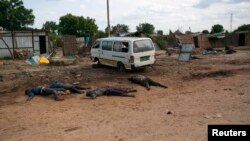South Sudan Information Minister Michael Makuei has defended an African Union (A.U.) decision not to release a report on human rights abuses committed during South Sudan's conflict.
"This document, even if it is released, will it bring peace to South Sudan?" Makuei told South Sudan in Focus in a telephone interview.
"The government believes the best way is to keep the report, pursue peace, and after reaching peace, then you come to issues of accountability," he said. "There's no way you will hold somebody to account at a time when we have not yet reached peace. That is a complicating factor."
Human rights groups Amnesty International and Human Rights Watch have slammed the decision by the A.U.'s Peace and Security Council to withold the report, which was supposed to be released at a summit late last month.
Makuei dismissed the rights groups' criticisms. "The so-called human rights organizations are not serious... They don't want peace for South Sudan," he said.
The Commission of Inquiry for South Sudan was set up by the Peace and Security Council last March to investigate human rights violations by parties to the conflict in South Sudan. Former Nigerian president Olusegun Obasanjo headed the committee, which was also supposed to make recommendations on accountability, reconciliation and healing.
The so-called human rights organizations are not serious... They don't want peace for South Sudan.Information Minister Michael Makuei
Makuei said making the report public now, before the conflict in South Sudan has been formally ended, would be putting "the cart before the horse."
"We will first bring peace and thereafter make people accountable," he said. "You cannot put the cart before the horse."
The U.S. Department of State, the United Nations, and rights groups including Amnesty International and Human Rights Watch have accused both sides in South Sudan's conflict of committing human rights abuses since December 2013. Among the alleged rights violations are targeted ethnic killings, sexual violence and the widespread destruction of property.
Obasanjo told the U.N. Human Rights Council in September that he had "no doubt that there have been gross violations of human rights in South Sudan" and that they have been committed by both sides.
"No South Sudan leader can claim innocence," he said.
Amnesty International researcher Elizabeth Deng said although the rights group has not seen the report, "From what we have heard, (it) names names."






